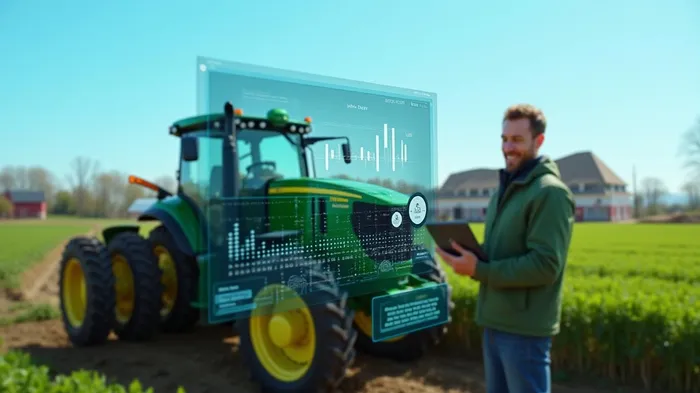John Deere Faces Regulatory Scrutiny Amid Tech-Driven Growth
John DeereDE--, the agricultural machinery giant, has entered a pivotal period as it balances regulatory challenges with ambitious technological investments. A confluence of events—from an FTC investigation into repair restrictions to product upgrades and a major earnings announcement—has placed the company under scrutiny while signaling its long-term strategic bets.

Regulatory Crossroads: The FTC Investigation
The U.S. Federal Trade Commission (FTC) has escalated its probe into John Deere’s restrictive repair practices, targeting the company’s use of software locks and authorization codes that limit independent repairs. According to a court filing in late April 2025, the FTC subpoenaed data from the Association of Equipment Manufacturers, signaling a broader investigation into market dominance. Farmers and regulators argue these practices artificially inflate repair costs and stifle competition.
The stakes are high: John Deere controls roughly 35% of the global agricultural machinery market, and its software-driven tractors and sprayers are critical to modern farming. Analysts at the Technology Policy Institute warn that the FTC’s findings could force Deere to adopt open data standards, reshaping its business model.
Betting on Precision Agriculture: 2026 Product Upgrades
While navigating regulatory headwinds, Deere is doubling down on innovation. In May 2025, the company previewed enhancements for its 2026 sprayer lineup, including:
- Variable-Rate Spraying: The See and Spray Select system now enables farmers to adjust fungicide and desiccant application based on real-time biomass data, requiring a G5 display.
- Auto Trac Vision 2.0: Improved navigation for crops as low as 4 inches, reducing yield loss.
- Retrofit Kits: A $500 million investment will expand these tools to 2018-model sprayers, extending their utility.
These upgrades reflect a $1.2 billion R&D spend in 2024, aimed at boosting precision agriculture—a segment expected to grow at 9% annually through 2030. “Deere’s tech investments are about more than just tractors; they’re about owning the data layer of farming,” said analyst Emily Carter of Argus Research.
Financial Outlook: Strong Sales, Uncertain Horizon
Deere’s April 30 earnings announcement underscored its financial resilience. First-quarter 2025 sales hit $8.2 billion, a 15% year-over-year jump, driven by autonomous drone systems and electric tractor orders. The company also reaffirmed its goal to achieve carbon-neutral manufacturing by 2035.
Yet, risks linger. The FTC’s investigation could lead to fines or operational changes, while global supply chain disruptions—highlighted in a Reuters report on April 27—threaten its $500 million electric tractor expansion. “Deere’s growth is tied to balancing regulatory compliance with tech adoption,” noted Bloomberg’s agricultural sector analyst.
Investor Takeaway: A Stock of Contradictions
John Deere’s stock (DE) has outperformed peers by 5% in the past year, but its trajectory hinges on navigating regulatory risks while capitalizing on precision ag. The FTC’s outcome, expected by early 2026, will be a critical inflection point.
For now, the company’s Q1 results and product pipeline suggest resilience. However, investors should weigh the potential costs of compliance against the upside of its tech-driven growth. “Deere’s future is in data, not just diesel,” said one analyst. The question remains: Can the company lead both?
Conclusion
John Deere stands at a crossroads, its path shaped by regulatory battles and technological ambition. With $8.2 billion in first-quarter sales and $1.2 billion invested in R&D, the company is betting on precision agriculture to drive growth. Yet, the FTC’s probe—potentially mandating open data standards—threatens its control over a $35 billion market.
For investors, the stock’s 15% YTD rise reflects confidence in its innovation pipeline. However, the FTC’s findings could redefine its value. The next 18 months will test whether Deere can balance compliance with its vision of “smart farming”—a pivot that could make or break its future.
Tracking the pulse of global finance, one headline at a time.
Latest Articles
Stay ahead of the market.
Get curated U.S. market news, insights and key dates delivered to your inbox.

Comments
No comments yet